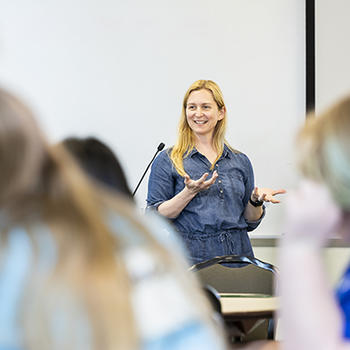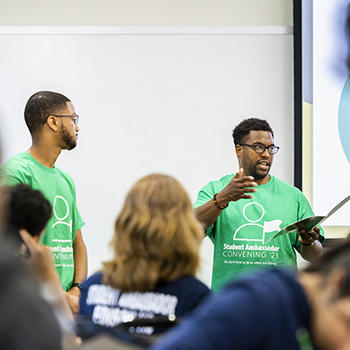In a conference room in Merten Hall at George Mason University 20 high school students sit in absolute silence.
At each table, teams of two play each other in a card game. But something is amiss: pairs look at each other across the table in confusion. Frustrated fingers poke at the score sheet, then to the pile of cards. Heads shake and nod emphatically as someone goes to take the pile, a wordless argument over who is right.

April Mattix Foster, associate professor of education In Mason’s College of Education and Human Development, then reveals the twist: “You are all playing by different rules.”
The silence rule lifted, and the room erupted: shock, surprise, and exclamations of “I knew it!”
This is a lesson, Foster explains, in intercultural competence. Every school has its own culture, its own rules, she tells them. Their challenge as student ambassadors is to support new students by sharing these new rules while also being mindful of the rules and expectations they’re bringing to the table.
This was one breakout room of the Student Ambassador Convening, a collaboration between the College of Education and Human Development (CEHD), the Military Families and Veteran Initiative (MVFI), the Virginia Department of Education, and Fairfax County Public Schools (FCPS).
Nearly 100 student representatives and 20 advisors from 13 FCPS high schools gathered on Mason’s Fairfax Campus in June for a day of workshops and team-building activities to support the student ambassadors program: a school-based, student-led leadership program that brings together military and civilian peers to welcome all new students and create a sense of belonging in the school. As part of their Purple Star Designation, Virginia K-12 schools must show evidence of maintaining an active student ambassador program.
While there is an emphasis in the program on understanding the experiences of military-connected youth as they transition in and out of area high schools, any student transitioning into the FCPS system will be supported and assisted by the ambassadors.
“This is a peer-led program creating a sense of community in our schools,” explained Jennifer Drake Patrick, associate professor of education and member of the leadership team for MVFI. “They’re there to ensure that new students have someone to sit with at lunch, to show them to their classes, and to suggest clubs and extracurriculars. They help students feel welcomed and supported in whatever way makes the most sense for their school culture and community.”
Students spent the day learning about positive leadership, active listening, and holding intentional conversations. The day culminated in a brainstorming session which empowered the ambassadors to take the lead in considering how to improve their school’s programming in the fall.

“The students take the ideas and conversations they’ve heard today from our speakers and their peers, and bring that all back into their schools,” said Cedric Price, BA Integrative Studies ‘21 and MEd Curriculum and Instruction ‘22. As the founding president of Educators Rising, Price was invited back to Mason to co-led a session with fellow alum Philip Wilkerson, MEd Counseling and Development ‘12, on using your assets to guide your leadership. “It makes the schools more community-centered, more friendly, and more inclusive for who they are meant to serve.”
While the hands-on workshops and networking opportunities are critical for the success and growth of the program, there’s another benefit to having the students convene at Mason: introducing high school students to higher education.
“As a school of education, we want to think about how we can create valuable partnerships with local schools, and this is a great opportunity to do so,” said Drake Patrick. “Many of these students have never been to a college campus. This gives them the opportunity to see who Mason is and what the college experience is like."
McKenna Seay, an integrative studies major with a concentration in education studies and Bachelors to Accelerated Masters (BAM) pathway student for elementary education, was also supporting the event through Educators Rising. She was a student ambassador when she was in high school and was excited to see how the program has grown. “Colleges and high schools can learn a lot from each other, so to see that collaboration at an event like this makes me happy.”
“College was put on such a pedestal when I was in high school, and while my teachers said I would do well, it felt so out of reach,” said Sophia Castle, an integrative studies major concentrating in social sciences for education and fellow member of Educators Rising. Castle is also in the BAM program, working towards an MEd in Curriculum and Instruction. “The more that high schools and colleges can connect with each other, it will help students realize that college is attainable.”
“Mason takes its role as a state and public institution very seriously. Opportunities like this allow us to serve the community and keep alumni engaged, all while giving our students experiential, hands-on learning in supporting military-connected youth,” said MVFI director Keith Renshaw, Psychology Department chair. “In the Washington, D.C., metro region, where we have a lot of military personnel, knowing that Mason is committed and cares for the community—specifically the military community—speaks volumes.”
